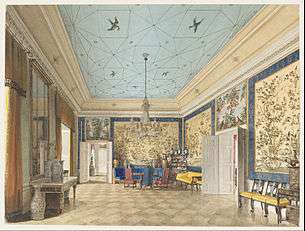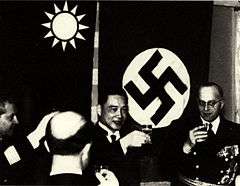China–Germany relations
Sino–German relations were formally established in 1861, when Prussia and the Qing Empire concluded the first Sino-German treaty during the Eulenburg Expedition. Ten years later, the German Empire was founded and the new state inherited the old Prussian treaty. The relations were, on the whole, frosty, with Germany joining imperialist powers like Russian Empire, Great Britain and France in carving out spheres of influence in the Chinese empire.
 | |
China |
Germany |
|---|---|
The Germans also participated in the crushing of the Boxer Rebellion. After World War I, relations gradually improved as German military advisers assisted the Kuomintang government's National Revolutionary Army, though this would gradually change during the 1930s as Adolf Hitler allied himself with Japan. During the aftermath of World War II Germany was split in two states: a liberal democratic West Germany and a communist East Germany. Cold War tensions led to West Germany's alliance with the United States against communism and thus allied against China. The Eastern part was allied through the Soviet Union with China. After the German reunification, relations between Germany and China gradually and vastly improved.
According to a 2017 BBC World Service Poll, 84% of Chinese people view Germany's influence positively, compared with 13% which view it negatively, while only 20% of Germans view China's influence positively, with 35% expressing a negative view.[1] Survey published in 2019 by the Pew Research Center found that 56% of Germans had an unfavourable view of China.[2]
History
Early contacts


Unlike Portugal or the Netherlands, German states were not involved, on the state level, in the early (16-17th centuries) contacts between Europe and China. Nonetheless, a number of individual Germans reached China at that time, in particular as Jesuit missionaries. Some of them played a significant role in China's history, as did Johann Adam Schall von Bell (in China in 1619-1666), who was in Beijing when it was taken by the Manchus in 1644, and soon became a trusted counselor of the early Qing leaders. Meanwhile, in Rome another German Jesuit, Athanasius Kircher, who never got to go to China himself, used reports of other Jesuits in China to compile China Illustrata, a work that was instrumental in popularizing knowledge about China among the 17th-century European readers.
The earliest Sino-German trading occurred overland through Siberia, and was subject to transit taxes by the Russian government. In order to make trading more profitable, German traders took the sea route and the first German merchant ships arrived in China, then under the Qing Dynasty, as part of the Royal Prussian Asian Trading Company of Emden, in the 1750s.
Early diplomatic relations
In 1859, following China's defeat in the Second Opium War, Prussia sent the Eulenburg Expedition to negotiate commercial treaties with China, Japan and Siam. On 2 September 1861, Friedrich Albrecht zu Eulenburg and a representative from the Zongli Yamen signed the Treaty of Tianjin, which opened formal commercial relations between China and Prussia, which represented the German Customs Union. Prussia would later on become the dominant and leading part of the newly founded German empire. The treaty would govern Sino-German relations until World War I, when the Republic of China repudiated the treaty unilaterally.
During the late 19th century, Sino-foreign trade was dominated by the British Empire, and Otto von Bismarck was eager to establish German footholds in China to balance the British dominance. In 1885, Bismarck had the Reichstag pass a steamship subsidy bill which offered direct service to China. In the same year, he sent the first German banking and industrial survey group to evaluate investment possibilities, which led to the establishment of the Deutsch-Asiatische Bank in 1890. Through these efforts, Germany was second to Britain in trading and shipping in China by 1896.
In 1897, the German empire took advantage of the murder of two German missionaries to invade Qingdao and founded the Jiaozhou Bay colony. In 1900, Germany took part in the Eight-Nation Alliance that was sent to relieve the Siege of the International Legations in Beijing during the Boxer Uprising.
Sino-German cooperation (1911-1941)

Although intense cooperation lasted only from the Nazi takeover of Germany in 1933 to the start of the war with Imperial Japan in 1937, and concrete measures at industrial reform started in earnest only in 1936, it had a profound effect on Chinese modernization and capability to resist the Japanese in the war.
Finance minister of China and Kuomintang official H.H. Kung and two other Chinese Kuomintang officials visited Germany in 1937 and were received by Adolf Hitler.[3][4]
At the same time, the exiled German Communist Otto Braun was in China as a Comintern agent, sent in 1934, to advise the Communist Party of China (CPC) on military strategy and taking a major part in The Long March under a Chinese name, Li De (Chinese: 李德; pinyin: Lǐ Dé); it was only many years later that Otto Braun and "Li De" came to be known as the same person.
World War II (1941–1945)
Sino-German cooperation collapsed in 1939 due to the start of World War II in Europe, forcing many Chinese nationals to leave Germany due to increased government surveillance and coercion. The example Japan set in the Second Sino-Japanese War forced Hitler to replace China with Japan as the Nazi's strategic ally in East Asia.[5] Following the Japanese Attack on Pearl Harbor in 1941, the Chinese declared war on Germany, which resulted in the Gestapo launching mass arrests of Chinese nationals across Germany. At the end of the war, the Chinese communities in cities such as Berlin, Hamburg, and Bremen that existed before the war were destroyed.
Division of Germany and the Cold War (1945-1992)

The Federal Republic of Germany or West Germany initially did not recognize the People's Republic of China primarily because of its hard-line anti-communist foreign policy of the Hallstein Doctrine. West Germany formally supported the One-China policy, in hopes of finding Chinese backing of the reunification of Germany. In October 1972, the West Germany officially established diplomatic contacts with the PRC, although unofficial contacts had been in existence since 1964.[6][7][8]
The German Democratic Republic also managed to have good relations with the PRC, despite the Sino-Soviet Split that occurred for most of the Cold War until the 1989 Sino-Soviet Summit.[9] Since the March 1982 speech on Sino-Soviet rapprochement by General Secretary Leonid Brezhnev to the Communist Party of Uzbekistan in Tashkent, Sino-East German relations began to steadily improve. In June 1986, Foreign Minister Wu Xueqian visited East Berlin in the highest-level Chinese delegation to Eastern Europe since the 1961 split.[10] Moreover, Chairman Erich Honecker visited Beijing in early October 1986, where he was met by President Li Xiannian with in a welcoming ceremony on Tiananmen Square a military band and a marchpast by the People's Liberation Army honor guard. The visit became the first official visit by an Eastern Bloc leader to the PRC.[11][12]
Reunification of Germany: friendly relations with China
The frequent high-level diplomatic visits are acknowledged to have helped guarantee the smooth development of Sino-German relations. From 1993 to 1998, German and Chinese leaders met face-to-face 52 times: Among those Chinese leaders who visited Germany were President Jiang Zemin; Qiao Shi, former Chairman of the Standing Committee of the National People's Congress (NPC); and Li Peng, former Premier and Chairman of the NPC Standing. Meanwhile, German leaders who visited China included President Roman Herzog, Chancellor Helmut Kohl, Foreign Minister Klaus Kinkel and Minister of State at the German Federal Foreign Office Ludger Volmer. Among these leaders, Chancellor Kohl visited China twice in 1993 and 1995. Since the new German government came into power in October 1998, Chancellor Gerhard Schröder has paid three visits to China. One after another from Germany came Vice Prime Minister and Foreign Minister Joschka Fischer, Defense Minister Rudolf Scharping, and Minister of Economics and Technology Werner Müller. At the same time, Germany welcomed Chinese Primer Zhu Rongji, Foreign Minister Tang Jiaxuan, State Councilor Wu Yi, Member of the Political Bureau of the Chinese Communist Party Central Committee Wei Jianxing as well as Vice President Hu Jintao.
Relations would continue to improve after 1998. For instance, both Beijing and Berlin fervently opposed the invasion of Iraq in 2003, and in 2006 both Germany (the largest economy and the most populous country of the European Union) and China further enhanced their bilateral political, economic and diplomatic ties within the framework of Sino-EU strategic partnerships. Both Germany and China opposed direct military involvement in the 2011 Libyan civil war. Before the 2011 visit of China's PM Wen Jiabao, the Chinese government issued a "White Book on the accomplishments and perspective of Sino-German cooperation", the first of its kind for a European country. The visit also marked the first Sino-German government consultations, an exclusive mechanism for Sino-German communications.
In July 2019, the UN ambassadors from 22 nations, including Germany, signed a joint letter to the UNHRC condemning China's mistreatment of the Uyghurs as well as its mistreatment of other minority groups, urging the Chinese government to close the Xinjiang re-education camps.[13][14]
In September 2019, China's ambassador to Germany stated that the meeting between Germany's foreign minister and Hong Kong activist Joshua Wong will damage relations with China.[15]
Trade
Germany is China's biggest trading partner and technology exporter in Europe.[16]
China is Germany's largest trading partner, superseding the United States since 2017.
The trade volume between China and Germany surpassed 100 billion U.S. dollars in 2008. By 2014 German Chancellor Angela Merkel had visited China on trade missions seven times since assuming office in 2005, underlining the importance of China to the German economy.[17]
In 2018, Mercedes-Benz apologized to China for quoting the Dalai Lama on Instagram.[18]
Embassies
The Embassy of China is located in Berlin, Germany. The Embassy of Germany is located in Beijing, China.
References
- BBC
- "People around the globe are divided in their opinions of China". Pew Research Center. 30 September 2019.
- kung with hitler
- Kung and chinese kuomintang with adolf hitler
- Wheeler-Bennet 1939, p. 8.
- Kooperation im Wandel: 30 Jahre diplomatische Beziehungen Bundesrepublik Deutschland - Volksrepublik China
- Alexander Troche: Berlin wird am Mekong verteidigt. Die Ostasienpolitik der Bundesrepublik in China, Taiwan und Süd-Vietnam 1954–1966. Düsseldorf 2001, S. 86.
- Gunter Schubert: Gunter Schubert - The European Dimension of German-Taiwanese Relations. Vortrag auf der Konferenz «The Role of France and Germany in Sino-European Relations» in Hongkong Juli / August 2001 PDF
- "Beyond Moscow: East German-Chinese Relations during the Cold War | Wilson Center".
- Markham, James M. (3 September 1986). "East Germany Steps up Contacts with China". The New York Times.
- "Honecker visits China".
- https://www.csmonitor.com/layout/set/amphtml/1986/1021/ohon.html
- "Which Countries Are For or Against China's Xinjiang Policies?". The Diplomat. 15 July 2019.
- "More than 20 ambassadors condemn China's treatment of Uighurs in Xinjiang | Xinjiang | The Guardian". The Guardian. 11 July 2019.
- "China envoy raps Germany over meeting with Hong Kong activist". Reuters. 2019-09-11. Retrieved 2019-09-12.
- Geitner, Paul (22 April 2012). "China, Amid Uncertainty at Home and in Europe, Looks to Germany". The New York Times.
- "Angela Merkel sets off for China to forge new economic ties". Herald Globe. Archived from the original on 2014-07-14. Retrieved 5 July 2014.
- "Mercedes apologises to China after quoting Dalai Lama". The Daily Telegraph. 7 February 2018.
.svg.png)
